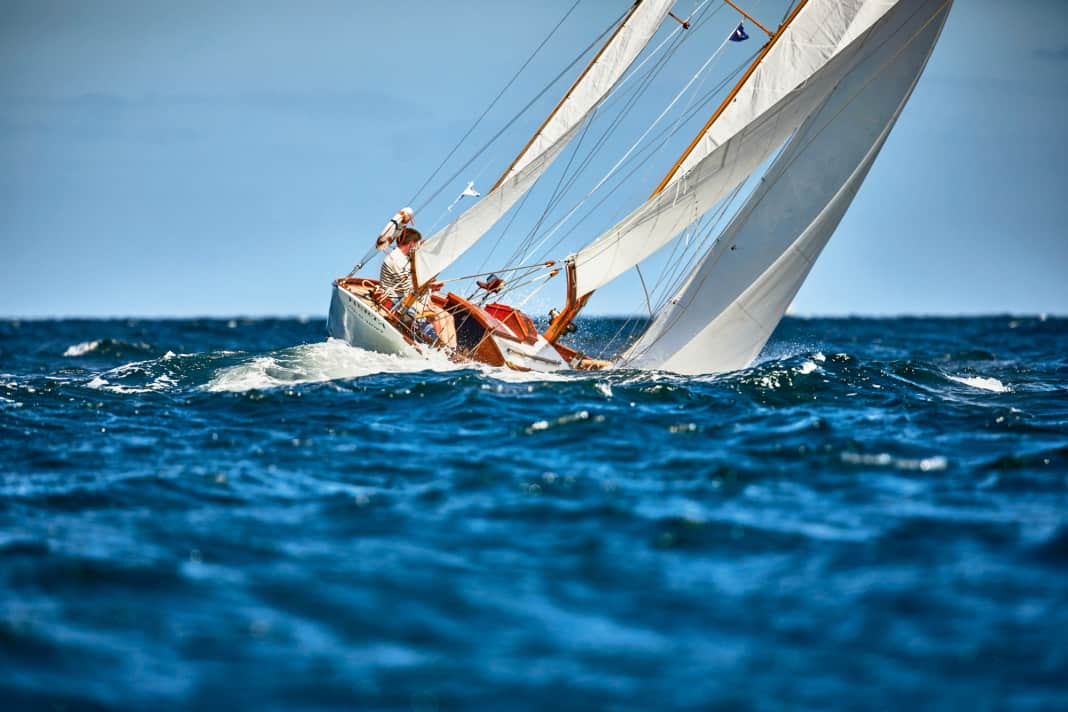





You come on deck for the first time this morning. The wood is wet, soaked with dew. The boat lies quietly at anchor, and mist hovers over the clear water of the bay. Further back, it becomes one with the reflection of the sea. The light mist is everywhere, as if everything were under a bright, semi-transparent bell. It is permeated by the glow of the rising sun, diffuse, almost unreal. You are alone, and creation is yours.
This might also interest you:
But life and the sea are not always like this. Because the sea has magic. And anyone who gets involved with it should understand it. The sea is unintentional, but it is so monstrous that it can change in a flash from a gentle appearance that is so calming and peaceful to the elemental force that sweeps everything away.
The sea shows us its own existence
Outside. Suddenly there was no wind. Something had changed. The air now seemed to be full of tension. It is bursting with crackling electricity. Your eyes search. And there, behind the island, you see the black wall that fills the sky. As your sloop leaves the lee of the island, only under storm jib, the black cloud falls over you. There is no way round it. The roar of D-puffs pulls your ship away with it. You have to surrender and hope.
Salty water from below. Sweet water pattering from the sky. Are those even single drops? Sentences from Buchheim's "Boat" throb in the brain: "The glassy green of the lakes is extinguished. The white veins have disappeared. The sea has aged a hundred thousand years. It is grey, miserable, pockmarked." The hurricane, the typhoon, the tsunami, the sudden squall - they all make people realise how small they are compared to the forces of nature.
"We are not completely in control of our destiny, we are subject to accidents, illness, death; we can suddenly lose someone's love, position, home. An invisible hand can emerge at any time from any quadrant of the compass and strike us down," writes Richard Bode in his book "Take a small boat first".
There is no audience at sea
Even devotion to that which is stronger than any human endeavour, even that is still a struggle. "The ocean is as unscrupulous as a savage despot," wrote Joseph Conrad almost 100 years ago. "It has always been the implacable enemy of all ships and men who have had the unheard-of temerity to venture upon its waters despite its dark brow." But every water also has a safe bay. Even if you reach it in the blackness of night, it embraces you like a mother's arms. Then you know what the symbol of the anchor means: support and safety.
The sea is also a sea of metaphors. They bear witness to what people have experienced, endured, hoped for and been given in nature. They have passed some of this on to our language - the horizon as a longing, staying the course, the tides of life. Why is the sea the source of such extraordinary experiences?
"Out at sea, there are no recognised top performances because there is no audience. Ambition, vanity and theatrics are pointless," writes Hans Domizlaff in his book "Dirk III". And above all: "The sea itself claims the sole power of judgement, relentlessly punishing and rewarding only with inner riches."
When you set foot on the deck of the ship, everything falls away from you. It is the entry into a world of its own, in which many things lose their value that are regarded with particular importance on land. Water is the element that transforms everything.
Match ball and player in one
Coming from the water gives you a completely new impression of the harbour cities that you may know from land. Coming from the sea means encountering the most beautiful side of these cities. In the past, when these cities were built, the harbour was the centre of urban life. Goods, merchants and wealth came from the sea. In this direction, the city presented itself with its chocolate side. The motorway that leads into the city today is only in the backyard.
Anyone travelling on a boat will find bays that can only be reached from the sea. They discover villages that are only connected to civilisation by a donkey path on land. You are "no longer dependent on spending your holiday as a guest in room 213 in an anonymous castle of beds. He doesn't have to fight for a berth on the beach between a large family and a cosy couple. He is not forced to visit the same restaurant night after night because it is the only one in his hotel neighbourhood. Anchor up! And everything is forgotten" (Paul Pollack, "Der erste Törn"). It would be nice. When there are so many people on the water at the same time in the middle of summer, you can forget about some bays and harbours.
Water does not act on its own, but is moved by incomprehensible forces. From the moon, from the wind, from thermals, from the earth's gravity. It is the largest part of our planet that we know less about than distant galaxies. Anyone who gets involved with water must realise that it makes you a pawn and yet nowhere is it more important than there. The fascination of the sea also lies in this paradox.
The desire to be outside and the hope for security.
Differences become common ground
It has been described since time immemorial. Whether the "rose-fingered Eos" rises over the sea, as Homer describes the dawn over the waters, or Buchheim. "The colours of the sea are as changeable as the colours of the sky: the sea steaming grey in the morning light. The black, the bottle-green, the grey, the violet, the white sea. The constantly changing structure of the sea adds new variations: the silky sea, the dull sea, the rippled, the roughened, the choppy sea. The choppy, the twitching, the dune-like sea."
The sea is sung about and painted. But few people realise that it can divide as well as unite. Friendships, love and marriages fail because of the narrowness of life on board. Only a few can be so close. Days become endless. Every wrinkle in the other person's face, every little fault in their character, every stupid habit becomes unbearable under the magnifying glass of closeness. And there is no avoiding it. But there are others too. They are the lucky ones. For them, their ship is their shell. It carries them. It envelops them. It protects them. And they enjoy being close to each other. Day by day, their lives become more and more centred on what is important to them. Days are filled with being. Differences become common ground.
In the last scene of the film, Sean Connery as the Russian commander in the tower of the submarine "Red October" says to his American counterpart Jack Ryan: "And the sea will bring new hope to all, just as sleep brings dreams at home." He is quoting Christopher Columbus. His words are 500 years old. But they still span the poles of longing: the desire to be outside and the hope of security.

The essay was published in the current issue of YACHT classic, which has been on sale since 21 May (available here). YACHT subscribers get the magazine delivered to their door for free. You can also read the portrait of shipyard founder Henry Rasmussen, the history of the "Nordwest" and look back on Classic Week 2024 in photos by Nico Krauss.

